University Essay: Psychological Challenges of Water and Home Birth
VerifiedAdded on 2022/10/02
|5
|1218
|54
Essay
AI Summary
This essay delves into the psychological challenges associated with water and home births, highlighting the physiological and emotional impacts on mothers. It explores the potential for labral tears and other physical complications in water births, which can lead to long-term pain and psychological distress, including anxiety and depression. The essay discusses the importance of providing social, emotional, and physical support to improve the birthing experience and mitigate these challenges. It examines the role of nurses and healthcare professionals in empowering mothers and addressing their fears, including those related to pain, control, and the overall birth experience. The essay references research on the impact of birth trauma and weak coping mechanisms, emphasizing the need for healthcare providers to understand the psychological aspects of childbirth to better support women during this significant life event. The essay concludes by underscoring the importance of addressing the psychological well-being of mothers in both water and home birth scenarios, advocating for strategies that promote better coping skills and a positive birth experience.
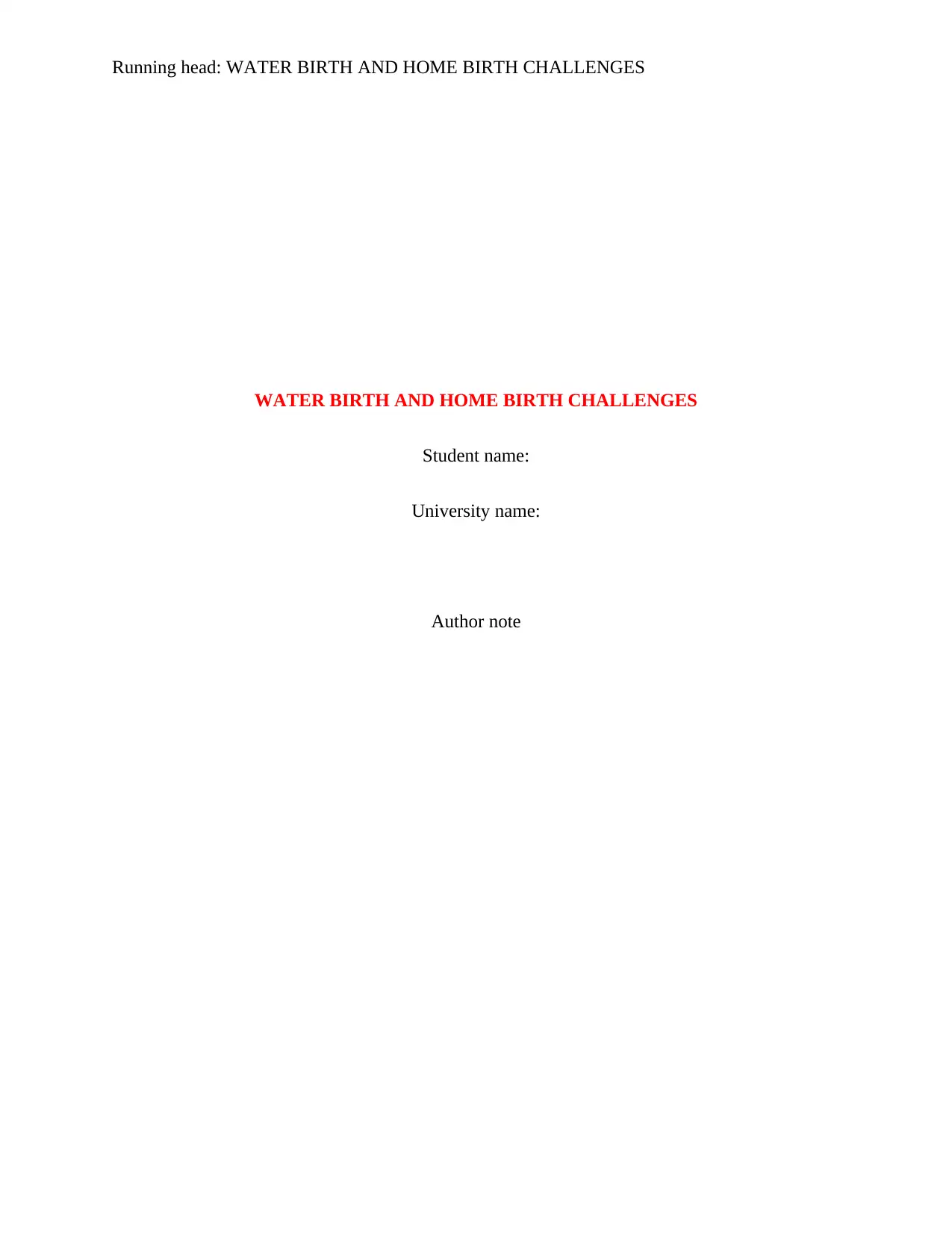
Running head: WATER BIRTH AND HOME BIRTH CHALLENGES
WATER BIRTH AND HOME BIRTH CHALLENGES
Student name:
University name:
Author note
WATER BIRTH AND HOME BIRTH CHALLENGES
Student name:
University name:
Author note
Paraphrase This Document
Need a fresh take? Get an instant paraphrase of this document with our AI Paraphraser
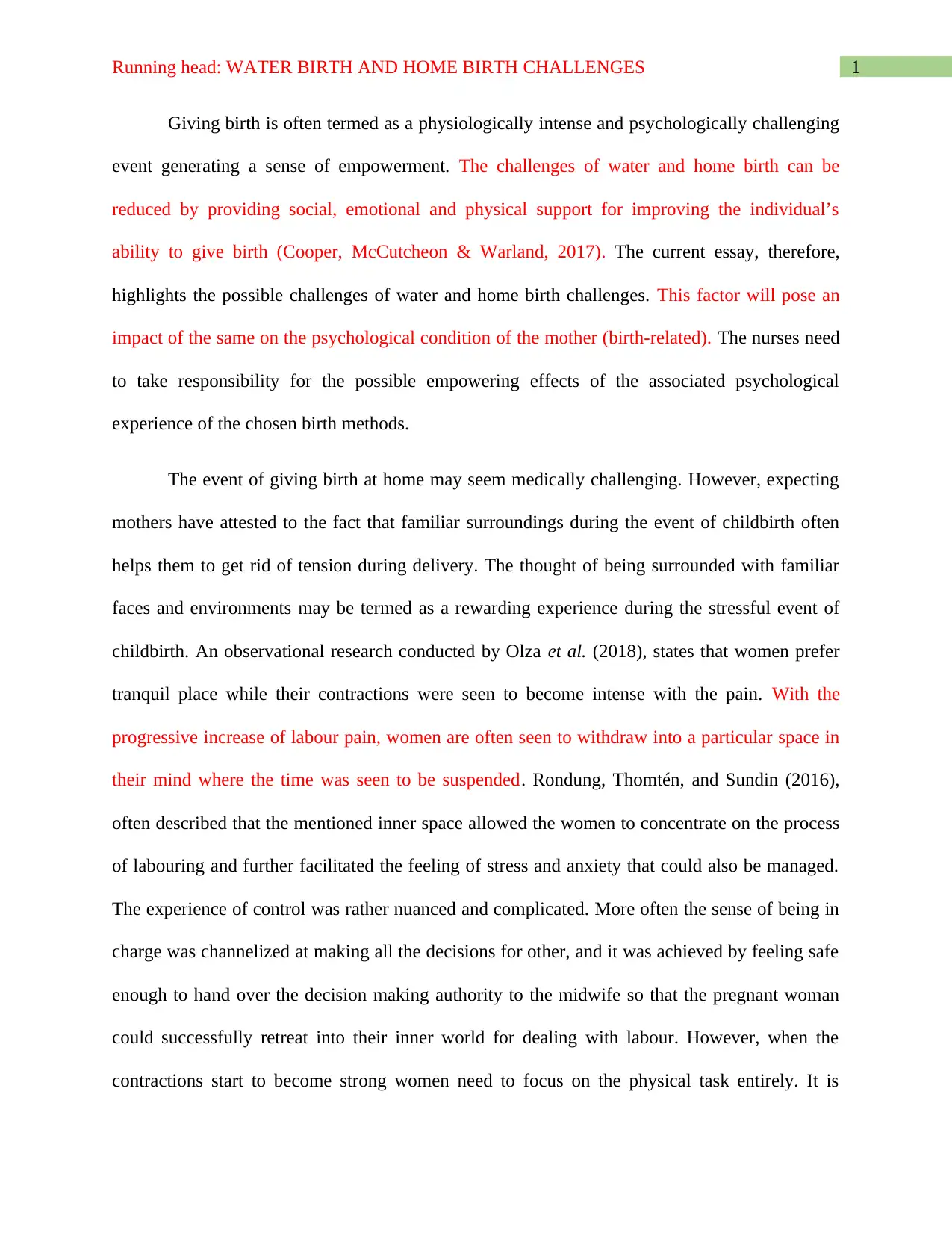
1Running head: WATER BIRTH AND HOME BIRTH CHALLENGES
Giving birth is often termed as a physiologically intense and psychologically challenging
event generating a sense of empowerment. The challenges of water and home birth can be
reduced by providing social, emotional and physical support for improving the individual’s
ability to give birth (Cooper, McCutcheon & Warland, 2017). The current essay, therefore,
highlights the possible challenges of water and home birth challenges. This factor will pose an
impact of the same on the psychological condition of the mother (birth-related). The nurses need
to take responsibility for the possible empowering effects of the associated psychological
experience of the chosen birth methods.
The event of giving birth at home may seem medically challenging. However, expecting
mothers have attested to the fact that familiar surroundings during the event of childbirth often
helps them to get rid of tension during delivery. The thought of being surrounded with familiar
faces and environments may be termed as a rewarding experience during the stressful event of
childbirth. An observational research conducted by Olza et al. (2018), states that women prefer
tranquil place while their contractions were seen to become intense with the pain. With the
progressive increase of labour pain, women are often seen to withdraw into a particular space in
their mind where the time was seen to be suspended. Rondung, Thomtén, and Sundin (2016),
often described that the mentioned inner space allowed the women to concentrate on the process
of labouring and further facilitated the feeling of stress and anxiety that could also be managed.
The experience of control was rather nuanced and complicated. More often the sense of being in
charge was channelized at making all the decisions for other, and it was achieved by feeling safe
enough to hand over the decision making authority to the midwife so that the pregnant woman
could successfully retreat into their inner world for dealing with labour. However, when the
contractions start to become strong women need to focus on the physical task entirely. It is
Giving birth is often termed as a physiologically intense and psychologically challenging
event generating a sense of empowerment. The challenges of water and home birth can be
reduced by providing social, emotional and physical support for improving the individual’s
ability to give birth (Cooper, McCutcheon & Warland, 2017). The current essay, therefore,
highlights the possible challenges of water and home birth challenges. This factor will pose an
impact of the same on the psychological condition of the mother (birth-related). The nurses need
to take responsibility for the possible empowering effects of the associated psychological
experience of the chosen birth methods.
The event of giving birth at home may seem medically challenging. However, expecting
mothers have attested to the fact that familiar surroundings during the event of childbirth often
helps them to get rid of tension during delivery. The thought of being surrounded with familiar
faces and environments may be termed as a rewarding experience during the stressful event of
childbirth. An observational research conducted by Olza et al. (2018), states that women prefer
tranquil place while their contractions were seen to become intense with the pain. With the
progressive increase of labour pain, women are often seen to withdraw into a particular space in
their mind where the time was seen to be suspended. Rondung, Thomtén, and Sundin (2016),
often described that the mentioned inner space allowed the women to concentrate on the process
of labouring and further facilitated the feeling of stress and anxiety that could also be managed.
The experience of control was rather nuanced and complicated. More often the sense of being in
charge was channelized at making all the decisions for other, and it was achieved by feeling safe
enough to hand over the decision making authority to the midwife so that the pregnant woman
could successfully retreat into their inner world for dealing with labour. However, when the
contractions start to become strong women need to focus on the physical task entirely. It is
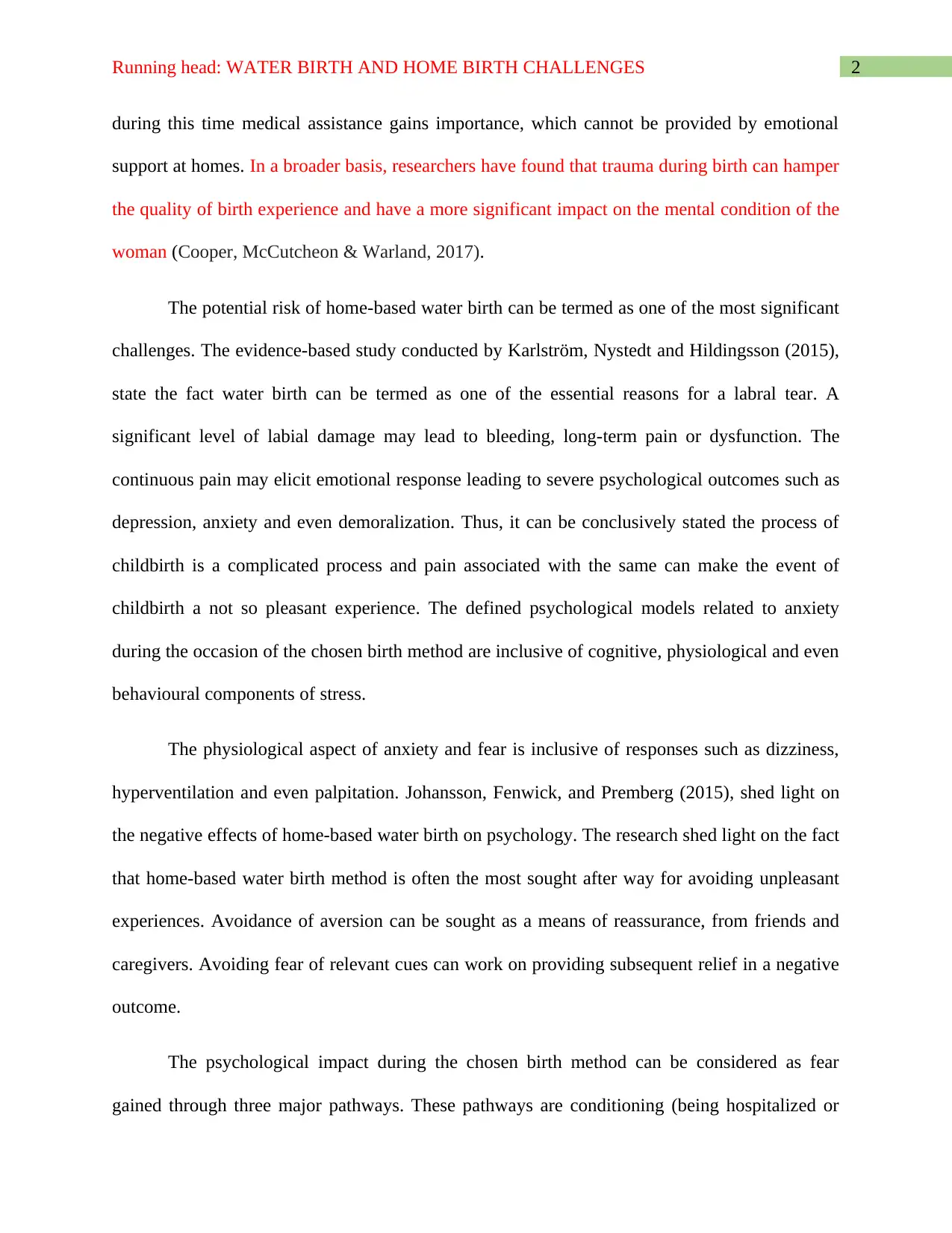
2Running head: WATER BIRTH AND HOME BIRTH CHALLENGES
during this time medical assistance gains importance, which cannot be provided by emotional
support at homes. In a broader basis, researchers have found that trauma during birth can hamper
the quality of birth experience and have a more significant impact on the mental condition of the
woman (Cooper, McCutcheon & Warland, 2017).
The potential risk of home-based water birth can be termed as one of the most significant
challenges. The evidence-based study conducted by Karlström, Nystedt and Hildingsson (2015),
state the fact water birth can be termed as one of the essential reasons for a labral tear. A
significant level of labial damage may lead to bleeding, long-term pain or dysfunction. The
continuous pain may elicit emotional response leading to severe psychological outcomes such as
depression, anxiety and even demoralization. Thus, it can be conclusively stated the process of
childbirth is a complicated process and pain associated with the same can make the event of
childbirth a not so pleasant experience. The defined psychological models related to anxiety
during the occasion of the chosen birth method are inclusive of cognitive, physiological and even
behavioural components of stress.
The physiological aspect of anxiety and fear is inclusive of responses such as dizziness,
hyperventilation and even palpitation. Johansson, Fenwick, and Premberg (2015), shed light on
the negative effects of home-based water birth on psychology. The research shed light on the fact
that home-based water birth method is often the most sought after way for avoiding unpleasant
experiences. Avoidance of aversion can be sought as a means of reassurance, from friends and
caregivers. Avoiding fear of relevant cues can work on providing subsequent relief in a negative
outcome.
The psychological impact during the chosen birth method can be considered as fear
gained through three major pathways. These pathways are conditioning (being hospitalized or
during this time medical assistance gains importance, which cannot be provided by emotional
support at homes. In a broader basis, researchers have found that trauma during birth can hamper
the quality of birth experience and have a more significant impact on the mental condition of the
woman (Cooper, McCutcheon & Warland, 2017).
The potential risk of home-based water birth can be termed as one of the most significant
challenges. The evidence-based study conducted by Karlström, Nystedt and Hildingsson (2015),
state the fact water birth can be termed as one of the essential reasons for a labral tear. A
significant level of labial damage may lead to bleeding, long-term pain or dysfunction. The
continuous pain may elicit emotional response leading to severe psychological outcomes such as
depression, anxiety and even demoralization. Thus, it can be conclusively stated the process of
childbirth is a complicated process and pain associated with the same can make the event of
childbirth a not so pleasant experience. The defined psychological models related to anxiety
during the occasion of the chosen birth method are inclusive of cognitive, physiological and even
behavioural components of stress.
The physiological aspect of anxiety and fear is inclusive of responses such as dizziness,
hyperventilation and even palpitation. Johansson, Fenwick, and Premberg (2015), shed light on
the negative effects of home-based water birth on psychology. The research shed light on the fact
that home-based water birth method is often the most sought after way for avoiding unpleasant
experiences. Avoidance of aversion can be sought as a means of reassurance, from friends and
caregivers. Avoiding fear of relevant cues can work on providing subsequent relief in a negative
outcome.
The psychological impact during the chosen birth method can be considered as fear
gained through three major pathways. These pathways are conditioning (being hospitalized or
⊘ This is a preview!⊘
Do you want full access?
Subscribe today to unlock all pages.

Trusted by 1+ million students worldwide
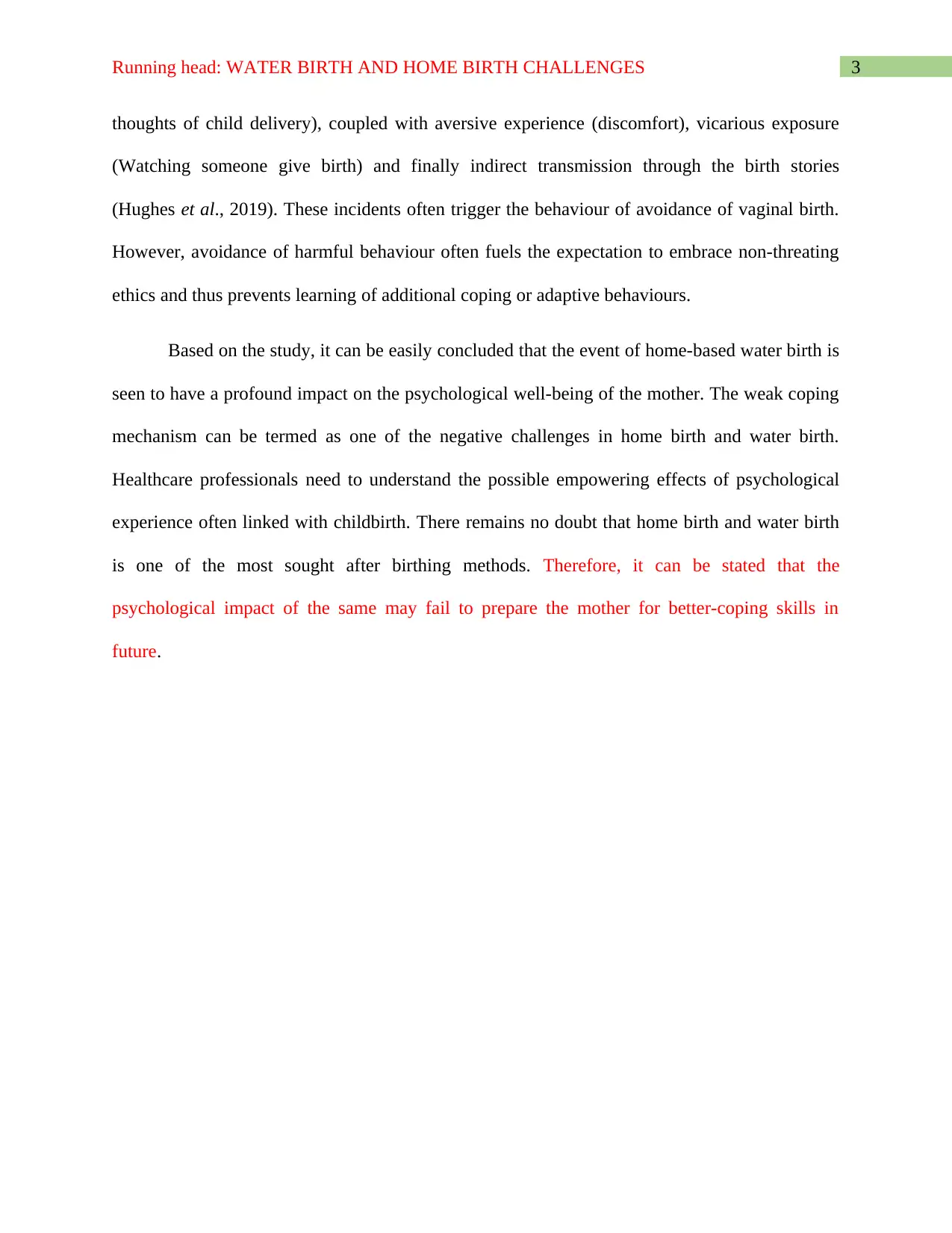
3Running head: WATER BIRTH AND HOME BIRTH CHALLENGES
thoughts of child delivery), coupled with aversive experience (discomfort), vicarious exposure
(Watching someone give birth) and finally indirect transmission through the birth stories
(Hughes et al., 2019). These incidents often trigger the behaviour of avoidance of vaginal birth.
However, avoidance of harmful behaviour often fuels the expectation to embrace non-threating
ethics and thus prevents learning of additional coping or adaptive behaviours.
Based on the study, it can be easily concluded that the event of home-based water birth is
seen to have a profound impact on the psychological well-being of the mother. The weak coping
mechanism can be termed as one of the negative challenges in home birth and water birth.
Healthcare professionals need to understand the possible empowering effects of psychological
experience often linked with childbirth. There remains no doubt that home birth and water birth
is one of the most sought after birthing methods. Therefore, it can be stated that the
psychological impact of the same may fail to prepare the mother for better-coping skills in
future.
thoughts of child delivery), coupled with aversive experience (discomfort), vicarious exposure
(Watching someone give birth) and finally indirect transmission through the birth stories
(Hughes et al., 2019). These incidents often trigger the behaviour of avoidance of vaginal birth.
However, avoidance of harmful behaviour often fuels the expectation to embrace non-threating
ethics and thus prevents learning of additional coping or adaptive behaviours.
Based on the study, it can be easily concluded that the event of home-based water birth is
seen to have a profound impact on the psychological well-being of the mother. The weak coping
mechanism can be termed as one of the negative challenges in home birth and water birth.
Healthcare professionals need to understand the possible empowering effects of psychological
experience often linked with childbirth. There remains no doubt that home birth and water birth
is one of the most sought after birthing methods. Therefore, it can be stated that the
psychological impact of the same may fail to prepare the mother for better-coping skills in
future.
Paraphrase This Document
Need a fresh take? Get an instant paraphrase of this document with our AI Paraphraser
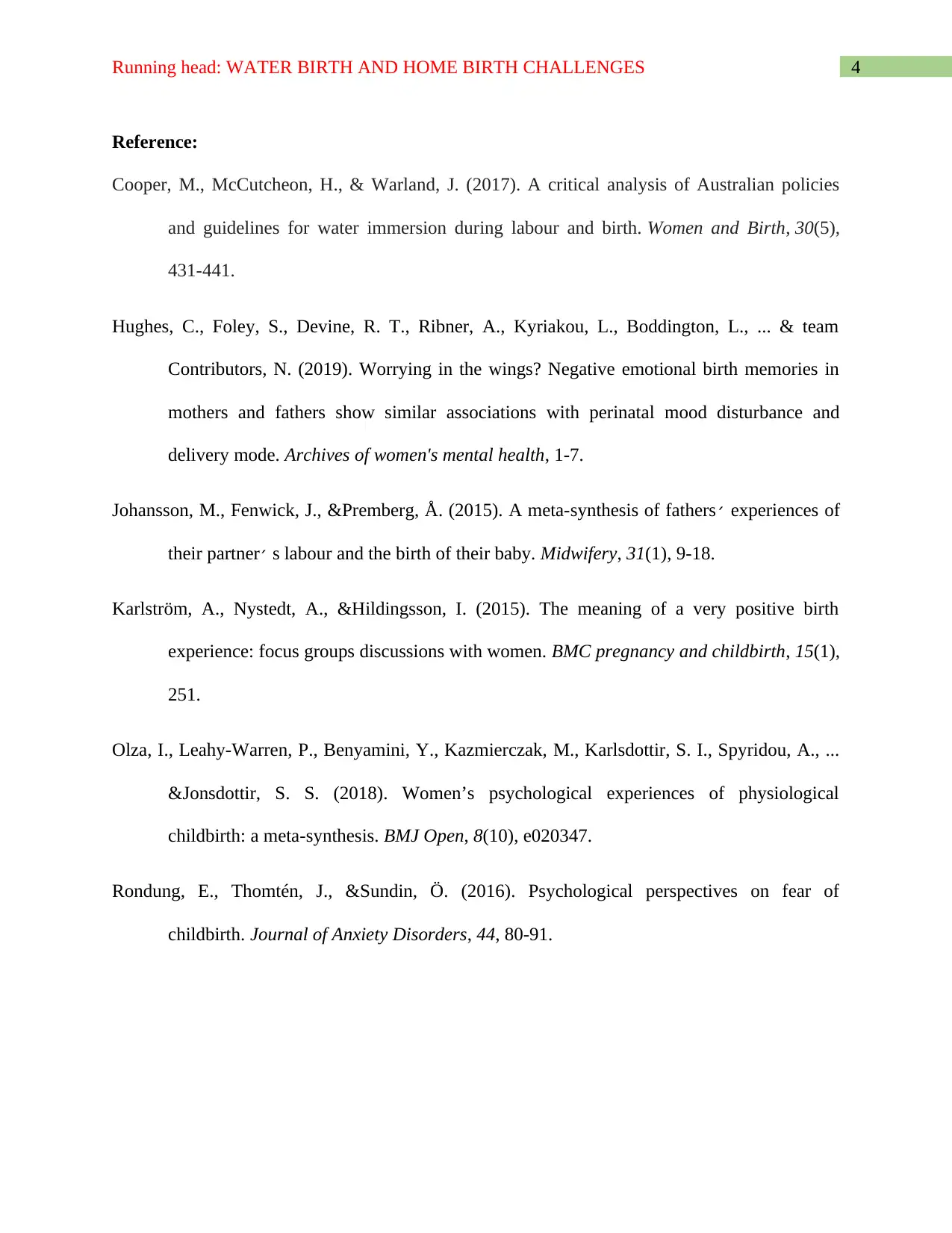
4Running head: WATER BIRTH AND HOME BIRTH CHALLENGES
Reference:
Cooper, M., McCutcheon, H., & Warland, J. (2017). A critical analysis of Australian policies
and guidelines for water immersion during labour and birth. Women and Birth, 30(5),
431-441.
Hughes, C., Foley, S., Devine, R. T., Ribner, A., Kyriakou, L., Boddington, L., ... & team
Contributors, N. (2019). Worrying in the wings? Negative emotional birth memories in
mothers and fathers show similar associations with perinatal mood disturbance and
delivery mode. Archives of women's mental health, 1-7.
Johansson, M., Fenwick, J., &Premberg, Å. (2015). A meta-synthesis of fathers׳ experiences of
their partner׳ s labour and the birth of their baby. Midwifery, 31(1), 9-18.
Karlström, A., Nystedt, A., &Hildingsson, I. (2015). The meaning of a very positive birth
experience: focus groups discussions with women. BMC pregnancy and childbirth, 15(1),
251.
Olza, I., Leahy-Warren, P., Benyamini, Y., Kazmierczak, M., Karlsdottir, S. I., Spyridou, A., ...
&Jonsdottir, S. S. (2018). Women’s psychological experiences of physiological
childbirth: a meta-synthesis. BMJ Open, 8(10), e020347.
Rondung, E., Thomtén, J., &Sundin, Ö. (2016). Psychological perspectives on fear of
childbirth. Journal of Anxiety Disorders, 44, 80-91.
Reference:
Cooper, M., McCutcheon, H., & Warland, J. (2017). A critical analysis of Australian policies
and guidelines for water immersion during labour and birth. Women and Birth, 30(5),
431-441.
Hughes, C., Foley, S., Devine, R. T., Ribner, A., Kyriakou, L., Boddington, L., ... & team
Contributors, N. (2019). Worrying in the wings? Negative emotional birth memories in
mothers and fathers show similar associations with perinatal mood disturbance and
delivery mode. Archives of women's mental health, 1-7.
Johansson, M., Fenwick, J., &Premberg, Å. (2015). A meta-synthesis of fathers׳ experiences of
their partner׳ s labour and the birth of their baby. Midwifery, 31(1), 9-18.
Karlström, A., Nystedt, A., &Hildingsson, I. (2015). The meaning of a very positive birth
experience: focus groups discussions with women. BMC pregnancy and childbirth, 15(1),
251.
Olza, I., Leahy-Warren, P., Benyamini, Y., Kazmierczak, M., Karlsdottir, S. I., Spyridou, A., ...
&Jonsdottir, S. S. (2018). Women’s psychological experiences of physiological
childbirth: a meta-synthesis. BMJ Open, 8(10), e020347.
Rondung, E., Thomtén, J., &Sundin, Ö. (2016). Psychological perspectives on fear of
childbirth. Journal of Anxiety Disorders, 44, 80-91.
1 out of 5
Your All-in-One AI-Powered Toolkit for Academic Success.
+13062052269
info@desklib.com
Available 24*7 on WhatsApp / Email
![[object Object]](/_next/static/media/star-bottom.7253800d.svg)
Unlock your academic potential
Copyright © 2020–2026 A2Z Services. All Rights Reserved. Developed and managed by ZUCOL.


